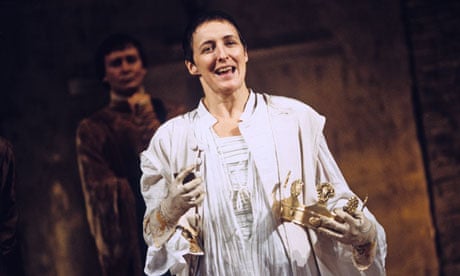Sarah Bernhardt played Hamlet, Fiona Shaw has played Richard II and Kathryn Hunter was King Lear, but they were surrounded by men on stage. While all-female productions of Shakespeare are frequent in North America, they are still a rarity in the UK. Perhaps it's simply the case that when you have Shakespeare as your national dramatist, it's harder to separate the plays from 400 years of performance history – a performance history dominated by penises and poetry. As we've discussed before, it often it takes directors from outside the UK to really look at the plays differently and shed fresh light on them.
Not since the 2003 Globe revival of Richard III, which boasted a triumphant Kathryn Hunter in the title role as a gleeful, scampering villain with a highly developed sense of the ridiculous, has there been such a high-profile all-female production at a major theatre. Until now. The news that Phyllida Lloyd will direct an all-female and all-star cast in Julius Caesar (with Harriet Walter as Brutus, Frances Barber as Julius Caesar and Cush Jumbo as Mark Antony) at London's Donmar throws down the gauntlet, particularly at a time when the lack of significant roles for women is being debated.
Its significance lies not just in giving older actors at the top of their game an opportunity to play some mighty fine roles that would normally be denied them, but in the fact that it is taking place at a theatre in the heart of the British establishment. It's a bold and welcome move by the Donmar's artistic director, Josie Rourke, and one that may make us rethink cross-gender casting, just as 30 years ago we began to rethink colour-blind casting.
Nobody now dreams of questioning such casting because it has become a cultural norm. Just as nobody thinks it odd of the RSC's Gregory Doran to stage an all-black Julius Caesar, or the much-admired Propeller to perpetuate the Elizabethan convention of men playing women, there is no reason why all-female Shakespeare can't become a staple of our stages. With its emphasis on politics and conflict rather than gender, Julius Caesar is a good place to start, but the job won't be finished until all-female Shakespeare has as much a place in our theatre culture as classic all-male productions such as Cheek by Jowl's legendary As You Like It.









Comments (…)
Sign in or create your Guardian account to join the discussion